War is a Racket: Life After Service for Smedley Butler
War has long been a topic of fascination; the history, psychology, and impact on society. Consequently, it has been a part of our history since the earliest recorded date with the earliest known war happening in Mesopotamia in c. 2700 BC between Sumer and Elam.

One thing you can always count on humans having, is conflict. So how does someone who was one of the most decorated veterans go from the Military’s poster boy to one of the Military’s most outspoken critics?

Major General Smedley Darlington Butler was born July 30, 1881 in West Chester, Pennsylvania. He was the oldest son of a Quaker family. His father was chairman of the House of Naval Affairs Committee when Butler decided to leave High School early, just shy of his seventeenth birthday. Against his family’s wishes and his Quaker roots, he lied about his age and joined the Marine Corps.
He soon found himself off to fight in the Spanish-American war. This decision led to a very successful 34-year Military career, also serving in the Philippine-American War, the Boxer Rebellion, the Banana Wars, and World War I. His service earned him sixteen medals, five for valor. He’s received the Medal of Honor twice, only one of nineteen people to do so.
He was one of three to be awarded the Marine Corps Brevet Medal as well as the Medal of Honor, and he is the only Marine to have been awarded both awards for two different actions. Starting his journey as an idealistic teenager with dreams of freeing Cuba and helping other countries, he ended it questioning the industry that is War, and his role in securing U.S. influence and financial interests in other countries.

It’s hard to pinpoint exactly when Butler’s disillusionment started. Whether he always held the beliefs of war being a racket, but maybe felt the end justified the means, or if there was a specific instance that led to him changing the way he viewed the work he partook in. It seems that his discontent started, at least publicly, after World War I and his retirement in 1931.
Coming home to the US and seeing how the war has affected America and realizing who was profiting from the bloodshed, led him to begin to understand how destroying democracies abroad could lead to authoritarianism at home. Looking back on his years abroad, mostly in Latin America, he realized that America was dominating these countries and helped put people into power that could further their interests, such as Rafael Trujillo in the Dominican Republic and the dictators of the Somoza family of Nicaragua.
Both, at least for a time, were allied with the United States. This was done in order to protect Americas commercial and financial interests in these countries, and they were done while being backed by major companies such as, City Bank, J.P. Morgan, and the Wall Street investor Grayson M.P. Murphy.
Smedley later said:
“I spent 33 years and four months in active military service and during that period I spent most of my time as a high class muscle man for Big Business, for Wall Street and the bankers. In short, I was a racketeer; a gangster for capitalism. I helped make Mexico and especially Tampico safe for American oil interests in 1914. I helped make Haiti and Cuba a decent place for the National City Bank boys to collect revenues in. (Then) I helped in the raping of half a dozen Central American republics for the benefit of Wall Street. I helped purify Nicaragua for the International Banking House of Brown Brothers in 1902–1912. I brought light to the Dominican Republic for the American sugar interests in 1916. I helped make Honduras right for the American fruit companies in 1903. In China in 1927 I helped see to it that Standard Oil went on its way unmolested. Looking back on it, I might have given Al Capone a few hints. The best he could do was to operate his racket in three districts. I operated on three continents.”
Smedley advocates for veterans
Smedley Butler first started speaking out in 1932, when thousands of World War I veterans and their families congregated in Washington demanding the Veterans bonus they were promised. As the Great Depression raged on, many were still out of work. They were seeking cash payment of Service Certificates given to them eight years prior via the World War Adjusted Compensation Act of 1924. The problem was, these certificates were like bonds with a maturity date, and couldn’t be paid out until 1945.
President Hoover claimed the government couldn’t afford to move up the bonuses’ collection date. Forty-three thousand marchers showed up to Washington to protest; this became known as the Bonus Army. The marchers made camp to await Congress’ decision. Butler visited the men camping and gave them encouragement to keep fighting for their rights. Instead of fulfilling their demands, President Hoover sent an Army to clear out the camp using gas and bayonets. Some veterans died and many were injured. After that, Butler announced himself a “Hoover-for-Ex-President-Republican.”
A Coupe to overthrow President Roosevelt
Just two years later, in 1934, Smedley Butler blew the whistle on a proposed coup, later known as the “Business Plot.” He alleges that he was approached by Gerald C. MacGuire, a Navy veteran and bonds salesman that worked for Grayson M.P. Murphy, asking him to head an armed mob of veterans to storm The White House and intimidate President Roosevelt into resigning or appointing a cabinet secretary of their choice. The end game was to stop Roosevelt’s New Deal, which was aiming to put restrictions on the banking industry and had hopes of re-inflating the economy.
Many conservatives opposed this deal as they felt it was harmful to business and economic growth. This is similar to what happened in France that same year, the group was called the Croix de Feu, and they forced their Prime Minister to resign and put in a conservative in his place. This is where MacGuire got the idea, and what he hoped to accomplish in the United States, with Butler leading the way and J.P. Morgan at their backs. Most media didn’t take Butler’s allegation seriously when it was made public.
However, the committee of the House of Representatives did end up concluding that they believed these ideas were discussed, however there wasn’t enough evidence. No prosecutions were made and all parties mentioned denied any involvement.
Following what he witnessed with the Bonus Army and if he was, in fact, approached to lead a coup against the President, it’s not hard to understand why his opinion of our politics and how the Military is used, could have soured. It’s difficult to know precisely what made Major General Smedley Butler start questioning what was being done abroad and on home soil, as he never publicly stated the event that changed his outlook and what made him reflect on his own actions while in duty.
It could have been the Bonus Army or it could’ve been something that happened before that. When you’re in the thick of war, it might be hard to see the situation from all angles. Coming home and seeing the other side and finally seeing what he felt was the full picture, may have been what pushed Butler to reassess everything. In a Country as big as the United States, there are many different people and agendas in play, and sometimes it’s impossible to see every part.
All you can do is deal with the information you’re given, and be open to changing your mind as new information is learned, and Smedley Butler seemed to have figured out how to do just that.






